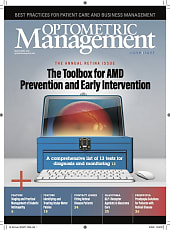AS OPTOMETRISTS, we all desire to provide the highest level of care to — and thereby reach the best possible outcome for — our patients. Whether performing an exam and prescribing spectacles or contact lenses or diagnosing ocular pathology and following a treatment plan, our desire is to make the patient see better, feel more comfortable and/or preserve her vision.
In developing and executing a treatment plan, it is imperative that the patient complies. We know that compliance is the No. 1 challenge in treating nearly anything in medicine that requires the acquisition of the therapy. While we can’t make the patient comply, we can make it easier for her to obtain various components of the therapy by providing them within the office.
Many pathological treatment plans include the use of ocular nutritional supplements. Whether it be AMD, dry eye disease (DED) or wellness, you want your patients to take the supplements you prescribe. To increase the likelihood of this, make them available within or through your practice. I have provided a large number of products within or through my practice to increase compliance with my treatment plan.
Here’s how to implement in-office dispensing and, therefore, increase compliance with your ocular nutritional supplement prescriptions.
1 CHOOSE YOUR PARTNERS
Each company is a bit different, as are the products, so find one with a product you are comfortable providing. Identify a reputable ocular nutrition supplement company partner. I define this as a company that has the following attributes:
- Scientific validation. I choose to partner with companies that make supplements validated via randomized controlled clinical trials. I, in turn, am able to share the results of these trials with my patients, validating and reinforcing the importance of my prescription of the supplement.
- Exclusive distribution. I also prefer to work with companies that offer products exclusively through doctors or by direct order. My reasoning: Shopping in the drugstore or supermarket aisle can lead to confusion or — worse — the purchase of the product that just happens to be on sale that week.
By the same token, I, personally, feel it is important to use a supplement company that offers a flexible distribution mode, which you will choose in the next step.
2 IDENTIFY YOUR IDEAL MODE OF DISPENSING
There are three options that I’ll review for dispensing of ocular nutritional supplements, along with the pros and cons of each:
- Provide all the product within your practice. Exclusively dispensing from the office offers a high patient adoption rate for getting started on supplements, but lower compliance once the patient has left the office (which can reduce the overall number of patients receiving the desired sustained benefits). This option also requires managing an inventory within the office.
- Provide a referral to the supplier website for purchase. Exclusively referring patients to purchase supplements on their own often means a lower chance that they will follow the “call to action” on the doctor’s prescription. But, for those who follow through, this method leads to higher compliance when receiving recurring home delivery and gentle reorder reminders from the company. This option does not require the management of a supplement inventory.
- A hybrid, provide a starter kit, and refer to supplier’s website. This option has the same pros and cons of the first options, but to a varying degree by offering both.
I, personally, utilize this option. Specifically, I maintain a smaller inventory to make sure a patient takes home an initial two-month supply, and then I refer her to the company’s website. The supplier I use provides a PIN number to the patient. The patient uses the PIN number on the supplier’s website, which links the patient to the practice and to the company for timely shipments and friendly reminders. This helps assure compliance and gets the patient on the road to receive the intended benefits of my prescription.

3 PROVIDE A STRONG PRESCRIPTION
It’s important to note that even if you choose a reputable ocular nutrition supplement company and use an ideal option for dispensing, neither will benefit the patient or your practice unless you set out a firm course of action. The patient is more likely to follow your treatment plan if it is concisely and confidently presented with specifics.
Prescribing should include necessary education, such as the previously mentioned clinical trial results, so the patient understands exactly why you selected the specific product. Having the necessary literature that further explains the benefit of what you are prescribing enhances this education.
For example, I will say: “I am prescribing this supplement to help lower inflammation and increase tear production. This gamma linolenic acid omega 6/omega 3-combination supplement has been validated by seven Class I studies, showing the effects I’m trying to achieve with you.”
The additional convenience and added value provided to the patient by offering the supplements in your office is then stated by staff at checkout. For example, the staff may say: “For your convenience, we stock the starter supply of the supplement. Subsequent dosages can either be picked up from the office, or you may sign up online to receive the future supply via monthly delivery.”
My patients seem to view this in a very favorable light.
BOTTOM LINE: PROVIDE THE BEST CARE
Doctors have sometimes told me that they feel providing ocular nutritional supplements in house is a conflict of interest. Yet, we don’t hesitate to provide specific frames and ophthalmic lenses in optical dispensaries. Nor do we question the ethics of prescribing and dispensing contact lenses.
While profit has not been my motivation, profit for the practice will figure into the equation if the model is implemented properly. In our DED practice, where we see an average of eight to 10 DED patients per day, we generate close to $20,000 in profits per year from DED supplements. (This is just an example. It may vary depending on the supplement and your pricing.) The method of offering ocular nutritional supplements through your practice is a part of ensuring patients receive the best care in a way that optimizes compliance and also compensates for costs and chair time.
Providing supplements in your practice will, in my experience, enhance compliance and, when successfully implemented, provide an additional revenue stream to your practice. OM




